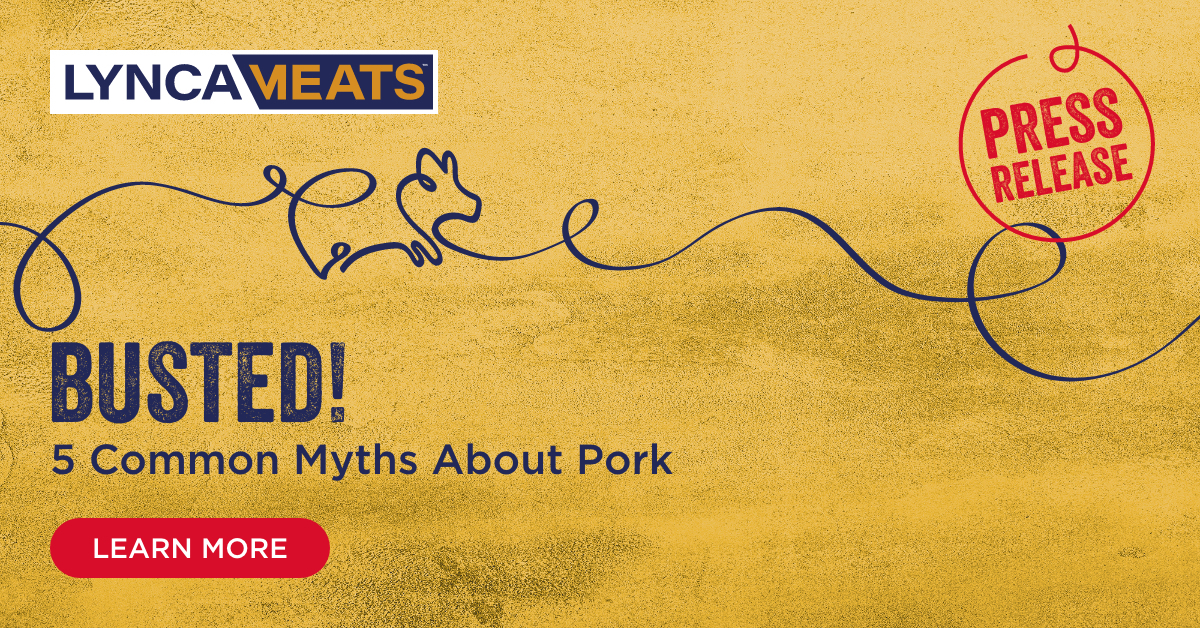Pigs are some of the earliest forms of livestock, first domesticated around 8,500 BC. Since then, pork as a protein source has become a favourite meat around the globe. However, many myths surround pork and its consumption, fueled in part by diverse religious and cultural beliefs, but also by misunderstanding and misinformation. Here are the facts behind 5 of the most common myths.
A healthy diet doesn’t have to be all chicken and tuna – Pork CAN be a healthy protein choice
Truth: While pork is often thought of as being high in fat, it mostly comes down to the specific cut of meat we are talking about. The leanest cut of pork – fillet or tenderloin –1 contains roughly the same amount of fat as skinless chicken breast. Trimming other pork cuts of excess fat can also make them far leaner – something your butcher should be only too happy to do for you. If you are in search of leaner cuts of pork, it’s a good rule of thumb to 2look for “loin” or “chop” in the name.
Well-raised pork does NOT contain illness-causing parasites
While outbreaks are not unheard of, their frequency has plummeted in recent decades as farming practices and meat processing facilities are held to higher and higher standards of hygiene. Despite being so uncommon, an added layer of protection from these diseases is simply to cook pork properly and buy pork products from reputable sellers who support reputable farmers. That brings us to our next myth…
Pork does NOT need to be cooked at extreme temperatures to be safe to eat
We all know someone who won’t eat pork unless it’s been thoroughly overcooked, but you may be surprised to know that the temperatures needed to cook pork is lower than you think. For pork, the minimum recommended cooking temperature is around 363°C, while ground pork – like all ground meats – should be cooked to at least 72°C.
There are no dirty pigs, only dirty farm.
Like with all livestock, the cleanliness of pigs is largely dictated by the conditions in which they are raised. Pigs, in and of themselves, simply do not deserve the reputation they get for being somehow dirtier than other animals. Pigs wallow in mud in order to cool off (their skin doesn’t have sweat glands) but raised in ideal conditions with adequate access to shade, they have a naturally clean nature. Like elephants and rhinos, they will sometimes take a dust or mud-bath to ward off flies, parasites and sunburn.
Pork is one of the world’s most loved and consumed meats
Chicken and beef may seem to take pride of place on the braai, but world figures tell a different story. 4Globally, pork is king, accounting for 36% of all the meat consumed in the world, followed by poultry (33%), beef (24%) and sheep/goats (5%). From Europe with its rich traditions of ham, sausages and charcuterie, to the Caribbean, the spicy dishes of Asia to the smokey goodness of the American BBQ, pork is a versatile meat that lends itself to thousands of delicious uses.
From taboo to the table! Because consumers are able to access better nutritional information to make the right choices for their families, pork is experiencing a renaissance all over the world. Tasty, affordable and versatile, it has a place on every dinner table, even for the most health-conscious of consumers.
References:
- https://www.jacksonville.com/article/20110818/ENTERTAINMENT/801246005
- https://www.pork.org/cooking/pork-nutrition/compare-pork-nutrition/
- https://www.foodsafety.gov/food-safety-charts/safe-minimum-cooking-temperature
- https://ask.usda.gov/s/article/What-is-the-most-consumed-meat-in-the-world
-Ends-
About Lynca Meats
From its humble beginnings as a family-run piggery in 1988, Lynca Meats has evolved into a leading pork producer in South Africa, processing over 360 000 pigs annually. At Lynca Meats customer partnerships and relationships are at the core of their success, they go the extra mile to provide each customer with a unique, customised service and product offering to ensure optimal customer satisfaction, growth and profitability. To underpin this passion and purpose and to ensure consistent quality, Lynca Meats implements rigorous safety and quality practices and are accredited with the highest quality management system worldwide, FSSC22000.
Food safety is an increasingly complex undertaking and producing safe, high quality and nourishing food are fundamental to Lynca Meats’ very existence. All quality certifications, highlighting that Lynca Meats systems rate amongst the best in the world to ensure food safety and consistent quality, includes Pork360 Abattoir Registration; SANS 10330: 2007 HACCP (SABS); PAS 220 (SABS); Woolworths Proof of Audits; Food Safety Assessment Audits and Export Status Certificate (ZA14).
Further information on Lynca Meats can be found by visiting their website at www.lyncameats.co.za.
For further information, please contact:
Refilwe Makamedi
M: 073 544 4376

